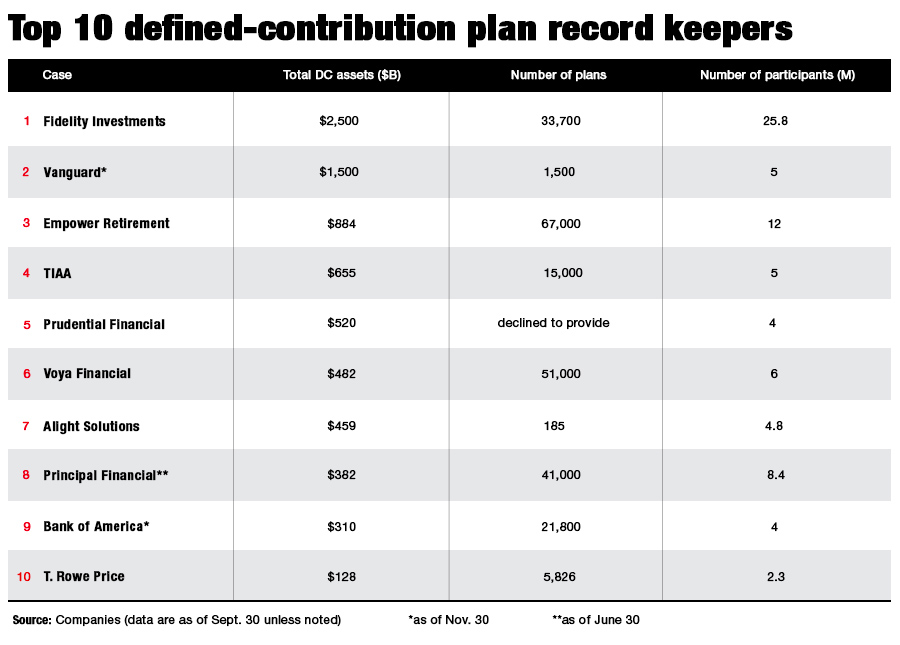

Retirement plan record keepers see some promise in pooled employer plans, but they also anticipate even more risk to their businesses, regardless of whether they provide them.
Almost indisputably, the first pooled employer plans, or PEPs, that launch this year will help increase private-sector retirement-plan coverage for workers, at least slightly. But those plans, with their promise of low fees, could further erode already thin margins. Offering PEPs also could threaten the good relationships record keepers have with third-party administrators.
Guests who attended the RPA Convergence Record Keeper Roundtable and Think Tank also pointed to another long-term risk — that PEPs ultimately flop. That would be a strike against the private retirement savings system, with Congress watching a centerpiece of the SECURE Act fail. Should that happen, attendees said, federal or state governments could become more aggressive in trying to expand retirement plan coverage through their own programs.

An even bigger worry they have is that a powerful outsider such as Amazon could step into the business.
“We’re entering the PEP market in the micro [segment],” meaning coverage for startups and businesses with fewer than 20 employees, said Adrian Hodge, division manager in Fidelity Investments’ retirement business. “We’re going to test and pilot it in that small space.”
Record keepers see different potential for PEPs than retirement adviser aggregator firms do, with the latter entities focusing more on applicability for midsize and large employers, Hodge said.
“The aggregators seem to think the PEPs are going to go way upmarket,” he said. “It’s really about Congress’s way to address coverage.”
Should PEPs fail to meaningfully expand retirement plan access, expect more legislation to address that, Hodge said.
Earlier this month, Raymond James surprised the retirement adviser world when it announced plans to buy plan provider NWPS, citing opportunities with PEPs.
There is potential for PEPs to take off with midsize employers, said Vince Garzarella, vice president of retirement plan services for mid and large markets at Lincoln Financial Group.
Such companies are often experiencing rapid growth or are longstanding businesses with minimal resources, Garzarella noted. PEPs can apply in both cases, as “it’s a lot easier for them to not have to make decisions, in that [plan] structure,” he said.
Conversely, the advent of PEPs will lead plan sponsors to negotiate for lower prices, thus threatening providers’ margins, he noted.
Retirement plan advisers will likely opt for PEPs for two main reasons, Hodge said. Non-specialist plan advisers who do more wealth management business will see PEPs as an easy way to provide access to a plan for those clients, he noted, And some plan specialists who act as 3(38) fiduciaries see PEPs as a way to scale up their business.
Record keepers’ plans
Some record keepers, including Transamerica and Voya, are not acting as pooled plan providers — at least not immediately. Transamerica instead is acting as a record keeper for a forthcoming PEP provided by Lockton, and Voya will do the same in partnership with Aon.
Part of the challenge in the upcoming PEP world is that companies that have long offered pooled plans of some variety, such as multiple employer plans, will have find ways to differentiate their services.
“We’re trying to figure out how do we still grow,” said Darren Zino, head of U.S. retirement sales at Transamerica. “This is a huge part of our business … [People] are talking about these things like they were born yesterday, and they really weren’t.”
Some providers are also waiting on further guidance from the Department of Labor about what arrangements will be allowed, such as whether the same company can provide the plan and investment options, said Tim Rouse, executive director of The Spark Institute.
“Nobody wants to build out something that isn’t going to get approved,” Rouse said.
Others, including Transamerica, are more interested in the SECURE Act’s “group of plans” provision, which beginning in 2022 will allow multiple 401(k) plans to file a single Form 5500, as long as the plan design, trustee, fiduciaries and administrator are the same.
Guests at the RPA event said that a record keeper’s decision to provide a PEP could hurt their relationships with TPAs, another group with a massive stake in the business.
“Ninety-eight percent of our plans are sold through a TPA for the generalist market, with a generalist adviser — that TPA is pretty beneficial,” said Mark Dence, national account director at American Funds. When a record keeper becomes a pooled plan provider, “if you do have a large TPA network, what is the message there?”
American Funds has explored a way for a PEP to accommodate multiple TPAs, but “it just doesn’t work,” Dence said.
“My greater concern is if PEPs don’t work to solve the coverage problem at the small end of the market … that’s where [there is] the threat of an Amazon coming in,” Hodge said. “Amazon has accounts with 70% of American households.”
If a company like Amazon wanted to provide individual 401(k)s, it could make contributions and investments very easy decisions for customers, allowing them to round up purchase amounts, with the excess going to the retirement account, he said.
One hurdle for a fintech player like Amazon would be regulation — retirement assets are heavily regulated, unlike the consumer goods the online giant sell, Dence said.
However, such a venture would likely be a wider play for data, meaning that a big fintech entrant wouldn’t necessarily need to maximize profits on a retirement plan business, guests said.
Tech companies also have the resources to provide high-quality services and experiences, and that would be bad news for record keepers, said Ben Thomason, executive vice president at Vestwell.
“My concerns are when a company like Google or Amazon decides to enter the business … They’re going to build something utterly fabulous,” Thomason said.

Executives from LPL Financial, Cresset Partners hired for key roles.

Geopolitical tension has been managed well by the markets.

December cut is still a possiblity.

Canada, China among nations to react to president-elect's comments.

For several years, Leech allegedly favored some clients in trade allocations, at the cost of others, amounting to $600 million, according to the Department of Justice.
Streamline your outreach with Aidentified's AI-driven solutions
This season’s market volatility: Positioning for rate relief, income growth and the AI rebound
